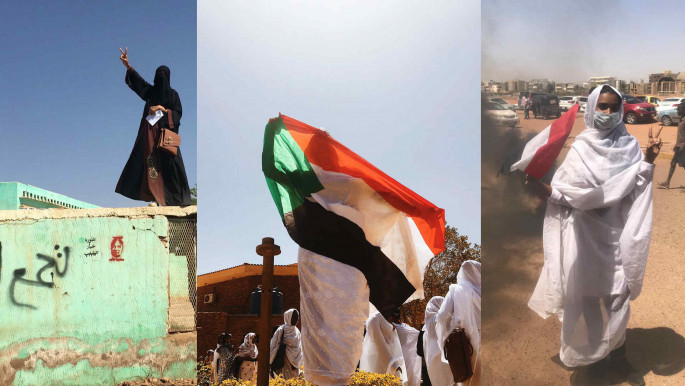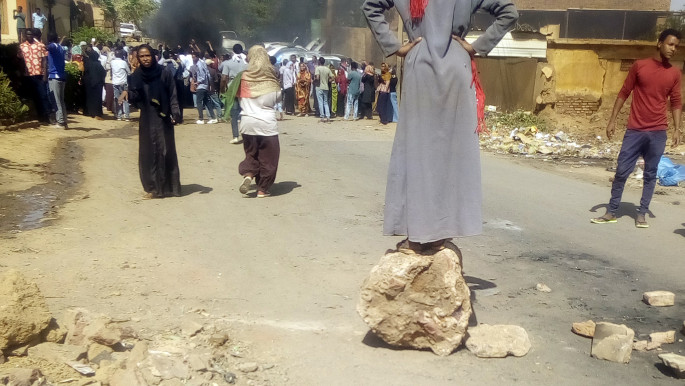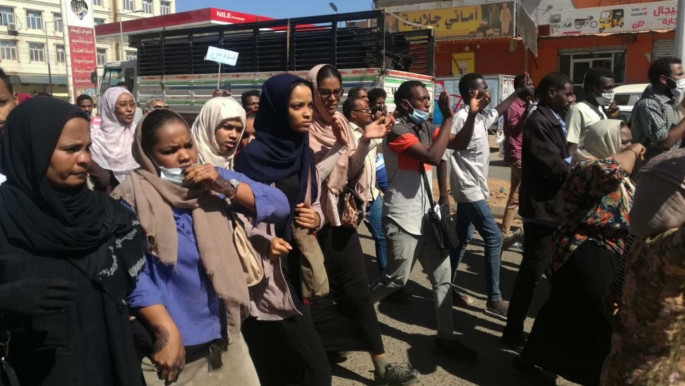Sudanese women detained and sexually harassed while protesting for change
"One of the security officers grabbed my hair and squeezed himself against my bottom, before throwing me to his colleague who grabbed my breasts. They then threw me into their truck that was carrying other women who had been arrested," she told The New Arab.
"They cut off the buttons of my shirt and started beating me up. Other women in the truck were crying," she said, before adding, "We have become used to being treated like this. It's a fine we have to pay."
The final year student of customs and trade at the National Academy in Khartoum is one of the hundreds of women who have been arrested for peacefully taking to the streets against the current regime.
Protests have rocked Sudan since December, with demonstrators accusing Bashir's government of mismanaging the economy and causing soaring food prices as well as regular shortages of fuel and foreign currency. Activists say more than 60 people have been killed, while the government has put the death toll at 34.
Some women have spent months in jail with reports of their hair being shaved off by NISS forces.
 |
|
|
Read also: 'Fighting for our stolen rights': |
"They cut their hair off and sexually harassed them, especially the young women just to terrify their families and prevent them from taking to the streets again. It's a way of trying to stop them from protesting," Amal Habbani, an award-winning activist with rights group, No to Women's Oppression, told The New Arab.
Some observers say that the number of women who have taken to the streets since the beginning of the protest is unprecedented and could reach to over 70 percent.
Ehsan Mohamed, a mother of one, was sexually abused when she was arrested during a protest in January in Downton Khartoum.
"I used to live in the UAE and when I came back to Sudan, I was shocked by the situation. I decided to join the protest and take to the streets but was then arrested. One of the men from the forces kept touching my hair. There was nothing we could do to stop them." She was released from prison four hours later.
 |
One of the security officers grabbed my hair and squeezed himself against my bottom, before throwing me to his colleague who grabbed my breasts |  |
 |
|
| Protesters chant slogans during an anti-government demonstration in Khartoum's twin city of Omdurman in March [Getty] |
Another woman, who preferred to remain anonymous, said she was beaten and sexually harassed by the security forces after being chased into their university campus in eastern Khartoum.
"They beat me hard with sticks, hitting private and sensitive parts on my body. I can still see black marks on my hips – I couldn't even tell my mother about it," she reveals.
"They threatened to rape us after taking us to their secret custody in the Alamarat neighbourhood in Khartoum. It was really terrifying," the 20-year-old Medical Science and Technology student told The New Arab.
Fifty women were released in March after spending months in detention, but according to the Coalition of Women Human Rights Defenders in Middle East and North Africa, at least seven more women were detained by government forces a few days later.
In February, the Sudanese president announced a state of emergency for six months, banning protests or any other type of gatherings. But the people of Sudan have continued to protest in big numbers chanting "Freedom! Peace! Justice!" and in recent weeks have been largely confined to Khartoum and its twin city of Omdurman.
On Thursday, Sudanese security forces fired tear gas at anti-government protesters in Khartoum, even after Bashir acknowledged that demonstrators had "legitimate" economic concerns. The protesters demonstrated in areas of Khartoum and Omdurman, including in the capital's districts of Burri and Jabra where they were confronted by riot police with tear gas, witnesses said. Analysts believe the protest movement has been the biggest challenge ever to Bashir's iron-fisted rule.
Read also: Azmi Bishara: Sudan, Algeria 'on the verge of democratic transition'
And as the protests continue, so will the violence against female demonstrators. According to the Human Rights Watch report in 2016, Sudanese security forces have used sexual abuse and intimidation on female human rights defenders.
 |
|
| Read also: Sudan: This time it's different |
Furthermore, No to Women's Oppression added that more than 43,000 women have been jailed and lashed for wearing "indecent clothes" or for walking with men in the streets, highlighting the perilous situation for women in the country.
But women taking to the streets against injustice is nothing new for those in Sudan, with many taking inspiration from Khalida Zahir, the first female doctor who was arrested and flogged in 1946 for opposing the British rule.
It is with this inspiration that encourages activists like Ayat Magdi, who is calling for other women on Facebook to share their stories of sexual harassment during the protests.
Her determination is admirable: "If they think we are afraid of them, they are wrong," she says. "I won't let it go like that."
Zeinab Mohammed Salih is a freelance reporter based in Khartoum and a member of The Marie Colvin Journalists' Network.
Follow her on Twitter: @ZeinabMSalih





 Follow the Middle East's top stories in English at The New Arab on Google News
Follow the Middle East's top stories in English at The New Arab on Google News


